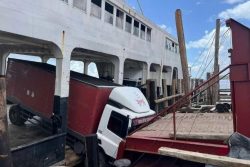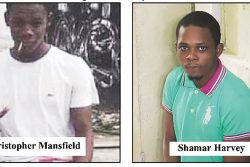Guyana is awash, virtually daily, with an array of ‘bad news’ stories. The ‘good news’ items are around, but they don’t always make the headlines; they remain invisible. This one I’m about to tell you goes back some years to around 2007 when steelband music had declined in Guyana. One or two bands were still around, but the art form generally was in the doldrums. However, with Carifesta looming here, the Minister of Culture, Frank Anthony, wanted to look at reviving steelband. He suggested the formation of a national steelband to debut at Carifesta, and appointed Andrew Tyndall, himself a panman, as Coordinator for the move. “We put out a call for former players to help reignite the thing,” said Tyndall, “and that also brought responses from a number of youngsters playing pan in school.” In the beginning, some of the senior players were dubious about a band with these young school children, but instructors (Andrew Tyndall, Cecil Bovell, Cary Gillis and Charles Gillis) were attached to the schools to start teaching. Tyndall recalls: “It was a very exciting time; we worked late in the night, and the senior players soon saw the enthusiasm of the youths, and we were off.”
Some of the schools had pans, but the ministry had purchased some new instruments, and the effort included our local tuners, ordering the tenor pans from Trinidad. Carifesta 2008 came and Guyana had a national steelband of over 100 members, with a wide repertoire of music, making good presentations at several venues.
After Carifesta, Tyndall said Minister Anthony decided the pan effort had to take a youth emphasis if it was to succeed, and instructors were hired to work with the schools that had pans but no one to teach the young players. These instructors – Cary Gillis, Terrence Benjamin, Compton ‘Ras Camo’ Williams, and Frank Lynch – began working regularly with the youths. Said Tyndall: “We also decided to keep the national band active and found space for them to practise. Some players left, but 30 of them stayed with the idea. And then, in 2009 we decided to resuscitate the steelband competition which had fallen by the wayside.” In that restart year, there were four bands competing. It was a small number, but Tyndall recalls, “enthusiasm was high.”
 A singular move, at this stage, was the offer from Republic Bank to sponsor the competition. The Bank agreed on the need for sustained training of players, and in 2010, Republic underwrote a Pan Minor Music Literacy Camp programme, which had originated in Trinidad. In the first year, using a staff of 8, the training produced 160 players new to the pan. Said Tyndall: “We had a manual so the same work was being done in Linden, Georgetown and Berbice. That programme has impacted tremendously on the art form especially in the schools. The progression took a gradual slope until 2012 we had moved from a total of 4 bands in the competition to having to hold a preliminary in the school-band category where we had jumped to 12.
A singular move, at this stage, was the offer from Republic Bank to sponsor the competition. The Bank agreed on the need for sustained training of players, and in 2010, Republic underwrote a Pan Minor Music Literacy Camp programme, which had originated in Trinidad. In the first year, using a staff of 8, the training produced 160 players new to the pan. Said Tyndall: “We had a manual so the same work was being done in Linden, Georgetown and Berbice. That programme has impacted tremendously on the art form especially in the schools. The progression took a gradual slope until 2012 we had moved from a total of 4 bands in the competition to having to hold a preliminary in the school-band category where we had jumped to 12.
“At the same time, the tuners were becoming better at the craft because they were busier. They started researching, using online information. One of the tuners was Ivan Chapman who has spent over 35 years training students in schools; you go into any steelband setting today you will find 4 or 5 players who were trained by him, and many of the early pans in the schools were made by him. He has made a tremendous contribution to pan in Guyana.” Also in 2012, Republic Bank sponsored an arranger’s workshop with Ray Holman, a renowned panman and tuner from Trinidad. One could see the results of that workshop in the next year’s competition in 2013 – there was a noticeable improvement in the standard of the music. Also, the players were becoming more aware of pan quality, and some of the bands began importing their front-line instruments from Trinidad opting for the chrome-plated tenor and double-second pans which produce better tone.
To sustain the improvement in the quality of the pans, the ministry, since 2012, has been using the money raised from the steelband competition to buy a set of instruments and donate it to a school wishing to start a new steelband. “Moving forward,” said Tyndall, “with a lot of work established in Georgetown, the focus now is on establishing bands in other areas. In 2014, we got a grant from Unesco and established a band in Pouderoyen, and there is a band in Region 6 and one in Bartica. Through the Unesco grant, the ministry was also able to develop a manual and instructional DVD for teaching elementary steelband, which has been a good resource tool to take pan outside of Georgetown.”
To keep the momentum, Tyndall stresses the need for corporate support. “Republic Bank has been with us since 2009, and they have really committed to this push. Most sponsors we get are there for the Mash period, but Republic Bank continues afterward. They sponsor the competition, but also recognize the value of sustaining the training so they have put a lot of money into instruction programmes. We are very grateful for that kind of support. And it’s not just ‘We give you a cheque.’ The staff, especially the Marketing Department, are integrally involved. They know the bands, they know the players, they come to the workshops and interact with the students. You couldn’t ask for more from them.”
Looking back to the start of the pan revival in 2007, Tyndall remembers the enthusiasm in the young players. “The interest was there. Students got involved. When you see them practising, there’s a lot of enthusiasm. They come to the workshops, ask a lot of questions; they are eager, you don’t have to push them.”
He stresses the need for more sponsors, such as Digicel with Parkside. “When you sponsor a band you’re helping to mould and shape young people. They get into a disciplined environment, they learn team work, they learn to be responsible, all of that they gain. They learn more than music; it helps to produce better young people in our society. We hear that from the parents of these youngsters, too.”
Part of the revival effort will be to encourage other businesses to sponsor concerts. The plan for 2015 is to hopefully find sponsors for once-a-month public concerts in the Gardens and other venues. Pan is no longer in the doldrums here. Go to the next steelband event you see advertised; you will be both surprised and delighted.








